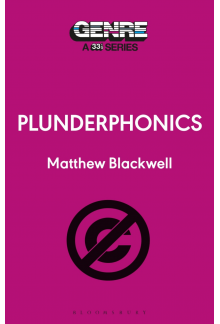Matthew Blackwell
Plunderphonics
Voted 0
ISBN: 9798765119488
Author : Matthew Blackwell
Published: 2025
Publisher: Bloomsbury Academic
Number of pages: 160
Language: English
Format: Paperback / softback
Format: 196.85×127
Author : Matthew Blackwell
Published: 2025
Publisher: Bloomsbury Academic
Number of pages: 160
Language: English
Format: Paperback / softback
Format: 196.85×127
Price:
Whe don't have this product
Delivery in Lithuania within 3-5 weeks. Possible delay
In stock. Delivery in Lithuania within 1-4 working days
Delivery in Lithuania within 3-5 weeks. Possible delay
Delivery conditions
Description
Featuring interviews with John Oswald, Negativland, and others and drawing on a wealth of research on copyright and intellectual property, Plunderphonics explores the impact of a genre that made illegality a point of pride.In Plunderphonics, Matthew Blackwell tells the storyf a group of musicians who advocated for changes to the copyright system by deploying unlicensed samples in their recordings. The composer John Oswald, who coined the genre term “plunderphonics,” was threatened with legal action by the Canadian Recording Industry Association on behalf of Michael Jackson. The Bay Area group Negativland was sued by Island Records on behalf of U2 for their parody of the band. These artists attracted media attention to their cause in a bid to expand fair use protections. Later, the Australian band the Avalanches encountered the limitations of the music licensing system during the release of their debut album, having to drop several samples that could not be successfully cleared. Finally, American DJ and producer Girl Talk released a series of albums featuring hundreds of uncleared samples and successfully avoided lawsuits by publicly arguing a fair use defense. This book narrates the conflicts between these artists and the recording industry. Blackwell places plunderphonics in the cultural contexts of postmodernism, Situationism, and culture jamming and analyzes responses to the genre from the media and the legal system. Along with histories of each artist, changes to American copyright law are tracked through important cases like Grand Upright v. Warner Bros. and Bridgeport v. Dimension Films. Though the legal terrain did not shift in the favor of plunderphonic musicians, they changed public perception of fair use and enabled more widespread sampling in underground music.
Reviews (0)
Write a review

